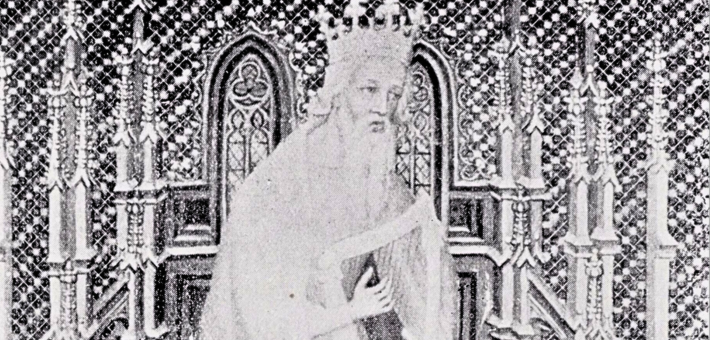Commentary on 2 Samuel 7:1-17
This passage in which God’s promises and covenant with David are recounted is one of the most important moments in the Hebrew Scriptures. God’s “eternal covenant” with the house of David has its origin story here, a covenant that has profound theological implications for both Judaism and Christianity.
In the Hebrew Scriptures the promise that God will raise up a ruler in the line of David is found in a number of places, including the passages in chapters 9 and 11 of Isaiah so familiar to Christians from Advent readings, and in a number of psalms (for example, Psalms 2:2; 18:50; 89; 132:10). For Christians, the unbreakable covenant with the house of David is the root of the messianic promise that Jesus fulfills (in the Psalms, especially, David is referred to as the “anointed one,” which is the meaning of messiah.
The New Testament presents Jesus as the unique heir to God’s promise to deliver God’s people—and indeed all creation—from all that oppresses them, through a descendant of the house of David (see, for example, Matthew’s opening genealogy, which ties Jesus directly to David).
There is significant word play in this passage on the word “house.” David wants to build God a house (a temple), but God rebuffs David on this point, implicitly reordering the hierarchy of grace: it is not for David to act as benefactor, building God a house; rather it is God who will act faithfully to David in building him a different kind of house—that is, a dynastic succession of leaders who will guide God’s people in an ongoing gracious covenantal relationship with God.
The purpose of a Davidic house is to bless God’s people through consistently faithful and winsome leadership. We see this in the Psalms, which consistently reiterate the idea that a faithful ruler must be characterized by a capacity to effect justice and righteousness in the community (see Psalm 72, for example; this understanding of the role of king as one who brings blessings to the people is widely shared in the ancient Near East). God’s faithfulness to the house of David will endure, which in turn will lead to the flourishing of God’s people. At least that’s the way it’s supposed to work!
At this point in the story David has become quite powerful—God’s chosen and anointed one, a charismatic and beloved king, a military champion. He is at the top of his game (there are still four chapters to go before he acts as predator and murderer in the Bathsheba/Uriah debacle), and now he suggests that he can be a kind of benefactor to God by building a temple for the deity.
Thus God’s flipping of the script about who exactly is bestowing a house on whom is a gentle but firm rebuke of David’s assertion of his own agenda and his own ego. Every leader, even if they are as gifted and beloved as David, requires a strong sense of humility and self-awareness if they are to be effective. Ellen Davis notes that the nuance and complexity of the portrayal of David’s kingship is in stark contrast to the uniform image of other Near Eastern kings as heroes and conquerors. Rather, “the detailed account of [David’s] kingship is Israel’s most thorough exploration of the problems and possibilities in human life with God.”[1]
Sometimes the covenants in the Old Testament are presented by scholars as either “conditional” (for example, Sinai) or “unconditional” (Noahic, Davidic), but this is a misleading way of thinking about them. All biblical covenants involve a complex interweaving of God’s unconditional love and God’s expectation of obedience—both are usually present. There is no such thing as a purely conditional or purely unconditional covenant. But there are varying emphases.
On the one hand, the Sinai covenant says: “If you obey my voice, you shall be my treasured possession,” which sounds conditional. But then we notice that in the whole of the Old Testament, God never abandons the Sinai covenant even though the people disobey again and again and again.
On the other hand, God’s covenant with David and his descendants in 2 Samuel 7 sounds pretty unconditional, but when you look closely at the story as it unfolds after the Bathsheba/Uriah mess, you see that David and his descendants suffer the consequences of David’s unfaithfulness to that covenant. The covenant is unbreakable but that does not mean there are no consequences for unfaithfulness.
Notes
- Ellen F. Davis, Opening Israel’s Scriptures (Oxford: Oxford University Press, 2019), 189.
PRAYER OF THE DAY
God of hope,
You promised to make David’s household great among the nations. Then you sent your son, Jesus, to transform this world so that all people are one in the great household of God. Show us how to live as your children, as sisters and brothers in your holy and blessed realm, in the name of your son, Jesus Christ, who will one day welcome us all home. Amen.
HYMNS
Unexpected and mysterious ELW 258
The angel Gabriel from heaven came ELW 265, H82 265
Hail to the Lord’s anointed ELW 311, H82 616, UMH 203
CHORAL
If thou but trust in God to guide thee, arr. Jody Lindh


October 20, 2024